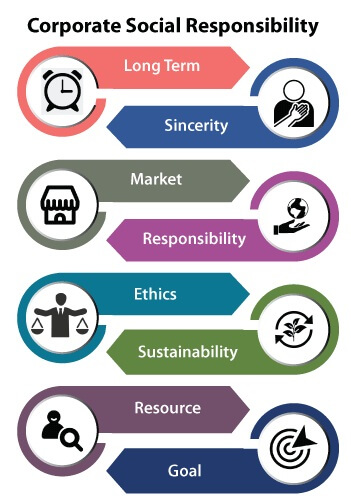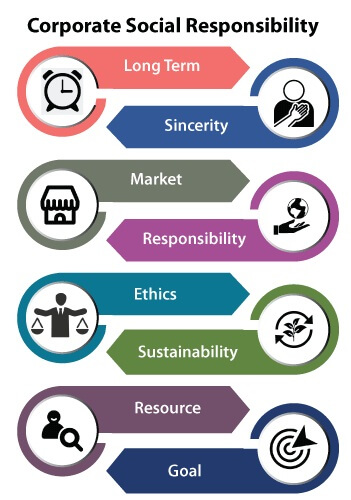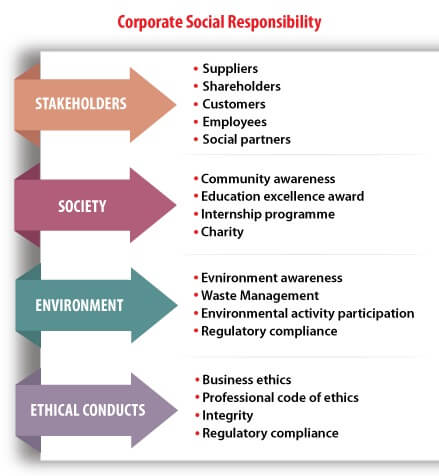Full Form of CSR
CSR: Corporate Social Responsibility
CSR stands for Corporate Social Responsibility. It is a concept of management. As per this concept, the companies combine or merge their social, environmental concerns or issues of their business or operations with the stakeholders. CSR is better known as the way through which an organisation or company can accomplish a balance of all the obligations, including social, environmental, and economical.

This is also known as the Triple Bottom Approach. This concept also aims at fulfilling the needs, expectations of the shareholders and the stakeholders.
Overview
- CSR is a type of business model, an international type of private business that strives to help, donate for the goals of the society, or even support or practice ethical concepts and ideas.
- CSR is an international organisation policy or is also known as the ethic strategy of the corporate. However, with the passage of time, many laws have developed, and many organisations have pushed the initiative beyond boundaries.
- CSR also includes practices to maintain and uphold the principles of sustainable development. So a company or organisation needs to be responsible, economically practical and even have an optimistic attitude and effect on the society and also respect the surroundings or the environment.
- It is clear and evident that CSR is a broad or vague concept and can vary depending on the company and the industry. It is crucial that society will benefit from the CSR programs, efforts and businesses simultaneously while enhancing or upscaling their brand.
- So CSR is valuable for society and the company. Their activities can help build a strong bond or connection between the employees and the organisations or companies. Their activities also help in fostering morale and more connection with the surroundings.

- CSR is a strategy of big or enormous corporations. The more successful a company is, it has more burden of responsibility to set an example for society, its competitors, etc.
- The idea or the concept of CSR or Corporate Social Responsibility has increased drastically since the pandemic or COVID 19. This pandemic has undoubtedly changed the outlook of the business for the society throughout the world.
- So as per the business model of CSR, a company should equally be active in social duties.
- Companies should give donations to various NGOs; Help people or society during hard times or calamities like earthquakes, floods, etc.
- Companies should also take part and promote talent in various fields like sports, culture, etc. Extensive and successful corporations should also take part in reducing or minimising pollution – water or air, etc.
- So, it becomes the responsibility of the company or the organisation to contribute to the development, advancement of society from all the means- social, economic, and environmental.
- The government of the country keeps a tight watch on the company’s CSR characteristics so that the companies or the organisations make sure to help the weaker or inferior section of the society.
- Some other crucial issues or CSR include stakeholder engagement; improvement in the working standard and conditions of the employees; social equity; balance between the gender; human rights; measure for corruption and malpractices.
- So, a well-implemented CSR can definitely bring a huge impact as well as change in society. It has immense advantages.
Benefits of Corporate Social Responsibility
Some of the benefits of CSR to the organisations or companies include;
Enhances recognition of the brand; Optimistic or better reputation of the company; Increase in the sales and also growth or expansion of loyalty of the customer; improved financial performance; better and improve ability and capability of the company to attract more talented employees and even improved ability that can help in retaining the employees; overall growth of the organisation and very easy and quick access to the finances or money.
- CSR can help you build or make a reputation as a responsible company which is definitely an advantage. Companies or the organisations always prefer to deal with socially and overall responsible companies.
- With the adoption of CSR, one can contribute and even save resources and reduce waste. This can ultimately help the environment and conclusively save money too. With better management and more responsibility, utility bills can be reduced, and savings can be made.
- As a responsible company, you can easily find and keep or recruit talented staff or employees and even retain the current or existing staff. This can also be helpful in keeping the employees motivates and making the recruitment process a success.

Some other benefits include;
- Investors are more likely to easily fund companies that are responsible and have CSR.
- Companies with CSR can even attract optimistic attention from the media and also help in establishing a good and balanced relationship with the authorities. This can make business easy and seamless.
So these were just a few of the benefits of Corporate Social Responsibility.
Disadvantages of Corporate Social Responsibility
CSR is considered as very important and beneficial, but there are certain disadvantages as well associated with it. Some of these include;
- CSR, if not done properly, cannot be beneficial. So a mistake or bad behaviour can be criticised on the company’s part. So CSR at times can lead the company to receive more criticism than appreciation.
- Another disadvantage of CSR is that it can increase the cost of the production and price of the product. More or fewer people like to spend on products that are cheap. So if a company follows or practices, CSR is at a disadvantage in comparison to the company not practicing it.
- CSR can put a risk to the reputation of the company. Even their brand reputation can hamper due to the shortcomings of their products shared by the company to the customers (As a part of the CSR business model).
- Corporate social responsibility is about considering the interest of the people, whereas the aim of the business is to create profit. So there can be a clash of the objectives if the business of the company. It can have a negative impact on the decisions.
Types of Corporate Social Responsibility
There are various types of Corporate Social Responsibilities that are essential to be followed by the companies. These are;
1. Environmental Responsibility
It refers to the fact that companies should behave responsibly when it comes to the environment. This is one of the most common responsibilities amongst the types of CSR. Companies can do their environmental responsibility by minimising pollution, greenhouse gas emission, and general waste; increase dependence on renewable energy resources; planting trees; research, etc.
2. Ethical Responsibility
Another important responsibility is to behave in an ethical manner. It is essential that organisations should behave in a fair and ethical manner. They should be fair and aim for fair treatment of all employees, customers, stakeholders, etc. They can even ensure ethical behaviour by making sure they are not procuring products or services from firms that are promoting child labour.

3. Philanthropic Responsibility
Another important type of responsibility of the corporate includes philanthropic responsibility. It refers to the aim of the business to work for the betterment of society, to make it a better place.
Companies should contribute a portion or share their earnings for the welfare of society, or they can even donate to the charity, NGO, or for missions or worthy causes.
4. Economic Responsibility
Another major responsibility of the company includes supporting of all the firms in their financial decisions. The goal implies to maximising profit and impacting society positively. So these goals should be achieved keeping in mind the responsibility or CSR responsibilities.